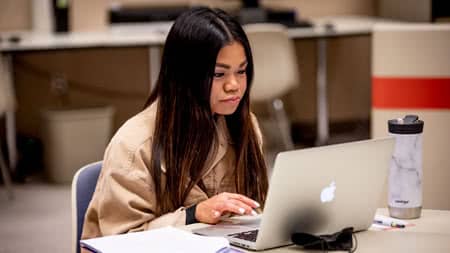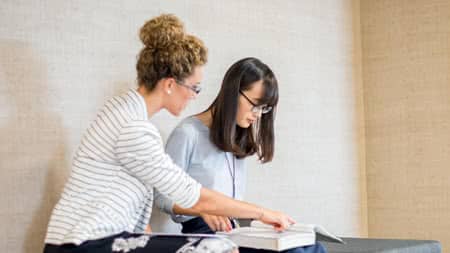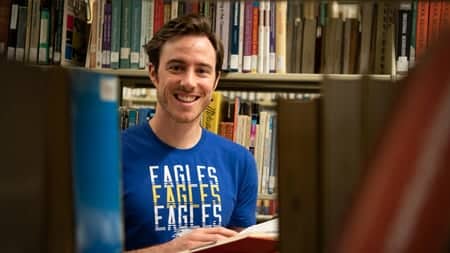
Nearly halfway through the semester means being only days away from midterms—that time when understanding concepts and studying skills are tested. While some Pensacola Christian College students might be ready to step up to the challenge, others may be looking for more ways to prepare.
Student Tutor Approved Studying Strategies
Chris Lordson (Jr., TX), a volunteer tutor for a variety of classes, primarily assists students with understanding chemistry and biology concepts. He’s commonly seen students struggle with connecting the dots between concepts and how they related to each other. “I’ve personally found that keeping track of the overall outline/theme of the chapter at hand helps to better process and understand the details within the chapter,” he said.
“Consistently studying over a long period of time is very important as well,” Chris added. “I often make it a goal to review class notes as soon as possible. As college students, we are often involved with various extracurricular activities, so it may be difficult to do this. However, by making this particular study habit a priority, you allow yourself to be better prepared for future tests and assignments.”

Nursing student Sydney Abbruzzese (Jr., OH) offers tutoring help in nursing and biology courses. In her own studying, she also uses educational YouTube videos and Kahn Academy to further understand concepts discussed in class and the memorization app Verses to study for Bible verse quizzes. “[Don’t] focus on your grade, but your understanding. We are in school to become professionals, and professionals make mistakes too. It is very easy to believe that a letter grade represents your worth.”
Sydney also encourages setting time aside to focus on general courses as well. “I find that my one-credit classes tend to slip to the back of my mind,” she said. “To fix that, I started handwriting those notes in class and then typing them on my computer later that week to review.”
What Teachers Suggest
Mrs. Joy Edwards, a nursing faculty member, teaches pharmacology to sophomore nursing students, and she believes that any student can form better study habits and score better on tests and quizzes. “It is best to review notes within 24 hours of lecture to process information into long-term memory,” she said. “If you wait until the last minute and cram-study, everything gets mixed up in the short-term memory. I encourage frequent review of notes, making sure that you understand the concepts, asking for help if you have trouble understanding concepts. Nursing is all about applying knowledge. You must have the knowledge to apply it.”

For those who struggle to keep track of a week’s activities, Edwards has a further suggestion. “Make a calendar with due dates and quizzes and tests, and plan for when you are going to complete projects and study,” she said. “You are going to have to be organized because there is so much going on. Block out everything on your calendar: classes, work, study time, project time, and yes—even time to relax and rest.”
Natural sciences faculty member Mr. Tim Bozeman teaches lab courses. When he was a student, he considered midterms to be a bittersweet time—thankful for being halfway through the semester but also working to persevere through testing. Now as an instructor, he hopes to help students understand class concepts.

“I would encourage students to come to us teachers if they are struggling,” said Bozeman. “Often times, students struggle needlessly because they did not ask their teacher questions because they were afraid or embarrassed to go to them. We are here for each student; we really do want to help them succeed and be equipped for God’s plan for their lives.”
Studying Hacks from the Academic Success
On the first floor of the Academic Building, a ready task force is prepared to support students in achieving academic success. As midterms near, the Academic Success Office is ready to suggest a variety of ways to begin studying smart instead of studying hard.
“Notecards can be taken into the dining halls. I recommend having a study lunch while studying them. Study groups can give a fresh perspective,” said Ben Archibald, an academic success coach. “Get notes from other classmates right before a test. They often take notes in a different way that helps give a well-rounded view of the class.”

Need further help with a class or how to study? Make an appointment! “Students can schedule a tutoring appointment on Eagle’s Nest,” said Micaiah Albert, another academic success coach. “Tutors can help students better prepare and study for midterms.”
Whether finding study strategies, helping with how to correctly format a paper, or showing how to best navigate and use the Rebekah Horton Library’s available resources, academic success coaches are ready to encourage any student. “The Academic Success Office is a one-stop shop for students to review and clarify concepts from their general education courses,” said Laura Vaught, Academic Success Office coordinator.
With notecards ready and calendars organized, it’s time to tackle the first major testing season of the semester with a little more confidence!
Studying Tips and Advice
- Review notes during the same day of a class.
- Find how class concepts relate to each other.
- Study an hour a day instead of several hours in one day.
- Rewrite class notes as review.
- Have scheduled study times.
- Go to a teacher for help understanding the lesson.
- Make an appointment with the Academic Success Office for further assistance!
- Try using apps to go over memory verses and understand class concepts.
